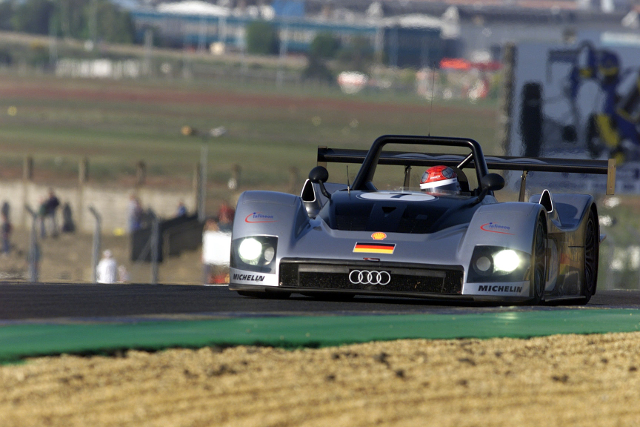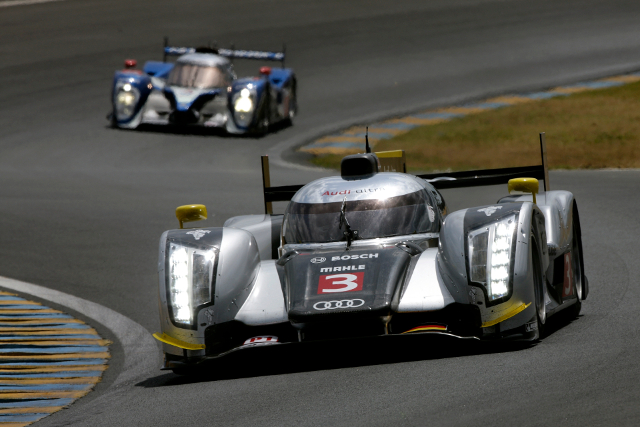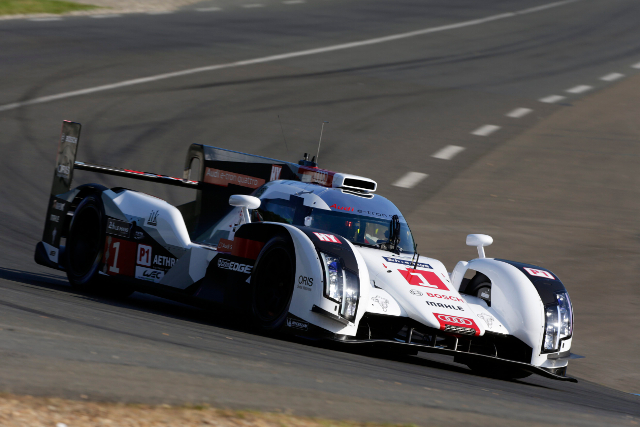Though one of the earliest manufacturers of motor vehicles, Audi was a late bloomer when it came to motorsport. It was an even later arrival to the world of Le Mans prototype racing. In 1885 the first of the four motor companies which would form Auto Union and later Audi was incorporated. One hundred and fourteen years after Wanderer, Audi arrived at the Circuit de La Sarthe.
Since then they have done rather well and in keeping with the pattern we set on Monday with the history of Chevrolet at Le Mans and their debut winners, we are set to be here for a while because the four rings have dominated the 24 Hours of Le Mans since their first ‘proper’ year.
Let’s take a quick look at the two (and a half) cars which failed to win on debut shall we?
One and a half of the cars raced in 1999. Audi’s debut year was one of learning for the team and between the factory and Audi Sport UK they brought both LMP900 and LMGTP spec cars. The ‘900 machines were the R8Rs and the GTP spec the R8C. The difference? The latter car had a roof.
The R8C had a bad race, after a troubled birth. While the sister cars managed a full testing programme the coupes were finished late and competed very few kilometres ahead of their debut in Le Mans. 22nd and 28th was the best the two cars could knock out on test day and they didn’t improve much during the month between the test and the race. Retirement for the #9 machine on lap 55 with gearbox problems was complemented by an on track stop for the #10 after compete gearbox failure after 198 tours. The Audi Sport UK team were out and the R8C was consigned to the history books.

Audi’s twin class attack of ’99 heralded the entry of the brand (Credit: Audi Motorsport)
Audi Sport Team Joest running the R8Rs had only marginally better fortune. They also contended with gearbox issues for both the R8Rs under their control though they coped much better. On the brand’s first try at Le Mans, Frank Biela, Didier Theys and Emanuele Pirro stood on the podium. They were beaten by the V12 powered BMW and the Toyota GT-One. Both were iconic cars which were headed for retirement at the end of the race.
The second failure of the win-on-debut test was the Audi R15 TDI, which arrived with much in the way of expectation in 2009. Exactly ten years after Audi first raced at Le Sarthe and claimed third place, it would fall to the #1 car of Tom Kristensen, Allan McNish and Dindo Capello to repeat the defeat.
It is at this point we need to remind you that only three times in the brand’s fifteen year history at Le Mans has an Audi failed to find a parking space under the podium after 24 hours.
2009 was the year that Peugeot Sport Total rose to take victory with the 908 HDi FAP, with the identical machine of Team Peugeot Total on the second step of the podium. The four rings were hobbled by a brace of off track excursions, one for the #2 Audi Sport Team North America machine which ended its race and the other for the #3 Audi Sport Team Joest entered car which dropped it fifty laps off the lead by the end of the race. The blistering pace of the Peugeots had the most successful of the Audis six laps down by 3pm on Sunday. A year later the R15 TDi Plus arrived and returned Audi to the top step of the podium.

With the R15 Audi’s veil if invincibility slipped (Credit: Audi Motorsport)
There have however been good moments for the four rings in the Pays de Loire.
The first debut victory for the brand came in 2000 when the Audi R8 LMP race car took to the track for the first time. Having learned their lessons well from the 1999 experiment the engineers focussed on an open cockpit solution to the question of Le Mans lap time. The result was the most successful Le Mans Prototype ever with five victories from six starts, with its sole drubbing coming at the hands of sister brand Bentley.
While the big guns of Toyota, BMW, Mercedes and Nissan had all called time on their Le Mans plans for various reasons, there was still competition to be had. GM brought Cadillac to the party in the form of the Cadillac Northstar LMP, Panoz brought their front engined prototypes while Pescarolo Sport maintained that last bastion of Gentlemen racers, the Privateer LMP900 entry.
After 24 hours of racing it was a clear and resounding yes for the R8. Frank Biela, Tom Kristiensen and Emanuele Pirro took the victory in the #8 car with the #9 and #7 completing the podium. Unfortunately for the American racers it was left to Pescarolo Sport to take what fight it could to the leading trio but even with home turf advantage, the #16 Courage C52 ended up 24 laps down on the leader at the end of the race.
When the factory teams switched to the R10 TDI in 2006 they started a new era in top class sportscar racing. Previously the only car ever to win a 24 Hour race running on diesel was a BMW 320d Touring Car, winning at the Nurburgring in 1998. When the Audi first turned its wheels in anger, at the 2006 12 Hours of Sebring, spectators and commentators alike were struck dumb by the noise of the engine, or lack thereof.
It is Ironic that the quietest race car to lap at Le Mans would be brought by a company whose name, in Latin, means hear!
What also astounded was the pace of the car. While only 2.118 seconds faster in qualifying than their principal rivals in class, the Courage based Pescarolo C60 Hybrid-Judd, when it came to the race they were untouchable. Audi took the win with the #1 car by four laps over the best of the Pescarolos. The second car was a further nine laps down on the #17 Pescarolo C60. Of greater moment here was the end of Tom ‘Mr Le Mans’ Kristensen’s unbroken streak of six 24 Heures wins, only one of which came without Audi.
Diesel was a genie that would never be put back into the bottle. A year later Peugeot arrived with the 908 HDi FAP, a closed coupe LMP1 car designed to put the open cockpit Audi in its place. ’07 and ’08 saw Audi put the young lion cubs in their place successfully but 2009 went to the French brand. 2010 saw the R15 TDI Plus lock out the podium for Audi again after turbo problems wiped out all three factory Peugeots and the ‘back up’ Oreca.
2011 was the big fight. Audi shocked the world when they uncovered their new LMP1 closed coupe race car, the R18 TDI. New regulations made it more effective to have a roof over the drivers head for the first time since the R8C, which caused no end of problems during the big race of 2011. Pit-stops were slower than Peugeot consistently for the first time as the drivers struggled to get used to the doors and roof. Visibility was drastically reduced too and other problems persisted throughout the race.
Faced with a rival which could go either faster or longer on fuel than the Audis, the trio of R18s had to box clever. There was no way the Audis could match the Peugeots on distance so they would have to blow them into the weeds with their pace.
Remember that reduced visibility?

The return of the roof: closed coupe R18 hit problem, but still beat Peugeot (Credit: Audi Motorsport)
Allan McNish was at the wheel of the #3 car when it clipped the #58 Ferrari of Anthony Beltoise. The R18 was speared across the gravel at the Dunlop curve, rolled and flipped violently before landing on the tyres by a photographer’s enclosure. Fortunately no-one was harmed in the incident but Audis chances took a massive knock when a similar incident obliterated Mike Rockenfeller’s #1 car at Indianapolis. It wasn’t looking good for Audi.
Step up the #2 car. Crewed by a trio of youngsters, seen almost as the training car and chased by three Peugeot 908s and a single old car, Benoit Treluyer, Marcel Fassler and Andre Lotterer did it all perfectly, crossing the line for victory but even there it was different. The usual slow final lap to a staged photo was abandoned as Andre Lotterer fought to stay ahead of Simon Pagenaud in the #9 908.
Audi had done it again, winning on debut with a brand new car.
The next year a lighter, revised version of the R18, the Ultra, took to the track alongside the all new and very impressive R18 e-tron Quattro. Audi was late to the e-tron ball, having been beaten to the punch of unveiling the first hybrid racer by Peugeot Sport who uncovered the 908 HY in 2009. Audi however continued to fund their racing while the shocking slowdown in sales for the French brand left everything but the development of their best-selling road cars in the bin.
Toyota joined the party with the TS030 Hybrid but it was an effort pushed forward by the exit of Peugeot and neither of the Japanese cars made it to the finish. That left Audi with yet another win on debut for a new model and the first ever Hybrid win at the 24 Heures du Mans.
This year it’s a new car again. Revised aerodynamics and improved hybrid mechanicals constitute the bulk of the changes, though the rules mandate a narrower track and increased overall height. Safety, always a concern, has also been improved.
The big question is if the new version of the R18 e-tron quattro can continue Audi’s impressive record for debut victories. While Audi may now have 12 victories to its name, the most successful brand in Le Mans history is back. Porsche top the pile with 16 wins and they have returned to ensure they stay up there. Toyota are also a force to be reckoned with and it could well be that Audi’s fourth defeat at Le Mans is just days away.



